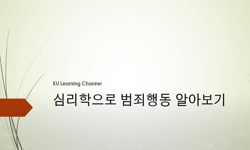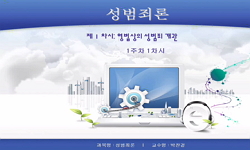So far the progress of feminist movement for equal treatment has firm results in law reform including special laws about sexual assault in Korea. For instance, the followings are enacted and enforced such as the law for equal employment fo...
http://chineseinput.net/에서 pinyin(병음)방식으로 중국어를 변환할 수 있습니다.
변환된 중국어를 복사하여 사용하시면 됩니다.
- 中文 을 입력하시려면 zhongwen을 입력하시고 space를누르시면됩니다.
- 北京 을 입력하시려면 beijing을 입력하시고 space를 누르시면 됩니다.

서구의 여성주의 법운동 및 강간죄 개혁의 성과와 성적 자기결정권의 함의 = The Accomplishments and Limits of Feminist Legal Movement in the Western Countries and Its Implication for Korea
한글로보기https://www.riss.kr/link?id=A76464910
- 저자
- 발행기관
- 학술지명
- 권호사항
-
발행연도
2006
-
작성언어
-
-
주제어
여성주의 ; 성폭력 ; 강간죄 ; 성적 자기결정권 ; 성적 의사소통 ; feminism ; sexual assaults ; rape ; sexual self-determination ; sexualcommunication
-
KDC
360
-
등재정보
KCI등재후보
-
자료형태
학술저널
- 발행기관 URL
-
수록면
829-855(27쪽)
-
KCI 피인용횟수
10
- 제공처
- 소장기관
-
0
상세조회 -
0
다운로드
부가정보
다국어 초록 (Multilingual Abstract)
So far the progress of feminist movement for equal treatment has firm results in law reform including special laws about sexual assault in Korea. For instance, the followings are enacted and enforced such as the law for equal employment for women(1987) and the laws about sanction of sexual assaults and protection for its victims(1994, 1997).<BR> The viewpoint about this feminist movement in law can be divided into two sorts by large. One is this reform for women in law is desirable, but the criminal law is still dominated by masculine point of view. The other argues that this movement will cause the excess of state’s punishments and disintegrate the democratic criminal justice of the society. If the sexual intercourse without consent would be criminalized by criminal law, all men ought to have written consents about sexual intercourse with women before the intercourse. This point of view criticize the women’s movement in law, because it reduces the chances for reflexive introspection toward interaction and communication between men and women.<BR> In fact, the radical women movement involves the risk for increase and conservation of masculinity in our society. The law reform for giving women the maternity leave could make benefit for women, but it also can reproduce the masculine culture that the work such as birth and child care are only the women’s duty and role.<BR> The legalization for guardianship of state for social minority, that is social-state legalization also have side-effect that normalize the masculine culture and sexual ideology and prejudice. Therefore, I think we need to review the results and limits of the women’s movement and equal protection movement and present the new way of women movement in legal area in Korea.<BR> Historically the feminism in legal area has been developed form the redefinition of rape and sexual assault in the late 1960s in the United Sates. In the U. S. during the 1960s, increasing number of women were employed, many women worked outside the home. With women’s increasing involvement in activities outside the home, the opportunity for a woman to be victimized increased. And women began to resist traditional definitions of appropriate feminine behaviour and expressed their dissatisfaction. During 1970s, rape became an important issue within the feminist movement. Sexual assault was redefined from the victim’s perspective. The act of rape was seen not as an end in itself, bust as a means of enforcing gender roles in society and maintaining the hierarchy in which men retained control. Feminists refuted the long-held belief that rapists were men who were helplessly controlled by overwhelming sexual impulses. Rape was a form of domination and control, a weapon used to enforce women’s subordinate role to men. This limits women’s opportunities to be active participants in the public sphere.<BR> Many rape crisis centers and rape hotline provide valuable assistance to victims of rape. Victims are provided with valuable information and escorted to the police station and the hospital, and volunteers serve as advocates for the victims. Feminists have lobbied for changes in rape legislation. Previous laws considered rape an all-or-nothing crime, in which convicted offenders received sentences that ranged from 5 years to life depending on the particular state’s statutes. Maximum sentences of 30-50 years in prison were not uncommon for convicted rapists. Now most states have revised their laws to include several levels of sexual assault with broad range of penalties. A perpetrator may be charged with first-, second-, or third-degree rape, with each charge varying in the maximum sentence following conviction. First degree rape is defined as forced sexual intercourse under aggravated circumstances. Second degree rape is described as forced sexual intercourse. Third degree is defined as nonconsensual intercourse or inter
목차 (Table of Contents)
- Ⅰ. 머리말
Ⅱ. 서구 여성주의 법운동 내지 법분석의 동향과 과제
Ⅲ. 형사사법상 남성주의적 법규정에 대한 비판과 그 검토
Ⅳ. 미국에서 강간죄에 관한 법개혁의 성과와 한계
Ⅴ. 결론 및 한국에의 시사점
【참고문헌(References)】
[Abstract]
- Ⅰ. 머리말
Ⅱ. 서구 여성주의 법운동 내지 법분석의 동향과 과제
Ⅲ. 형사사법상 남성주의적 법규정에 대한 비판과 그 검토
Ⅳ. 미국에서 강간죄에 관한 법개혁의 성과와 한계
Ⅴ. 결론 및 한국에의 시사점
【참고문헌(References)】
[Abstract]
동일학술지(권/호) 다른 논문
-
- 한국형사법학회
- 홍승희(Hong Seung-Hee)
- 2006
- KCI등재후보
-
- 한국형사법학회
- 천진호(Chun Jin-Ho)
- 2006
- KCI등재후보
-
형법해석에서 법정책적 논거원용의 타당성문제 - 객관적ㆍ목적론적 해석카논의 사용과 관련하여
- 한국형사법학회
- 변종필(Byun Jonp-Pil)
- 2006
- KCI등재후보
-
- 한국형사법학회
- 김호기(Kim Ho-Ki)
- 2006
- KCI등재후보
분석정보
인용정보 인용지수 설명보기
학술지 이력
| 연월일 | 이력구분 | 이력상세 | 등재구분 |
|---|---|---|---|
| 2022 | 평가예정 | 계속평가 신청대상 (등재유지) | |
| 2017-01-01 | 평가 | 우수등재학술지 선정 (계속평가) | |
| 2013-01-01 | 평가 | 등재학술지 유지 (등재유지) |  |
| 2010-01-01 | 평가 | 등재학술지 유지 (등재유지) |  |
| 2007-01-01 | 평가 | 등재학술지 선정 (등재후보2차) |  |
| 2006-01-01 | 평가 | 등재후보 1차 PASS (등재후보1차) |  |
| 2005-01-01 | 평가 | 등재후보 1차 FAIL (등재후보1차) |  |
| 2004-01-01 | 평가 | 등재후보 1차 PASS (등재후보1차) |  |
| 2003-01-01 | 평가 | 등재후보학술지 선정 (신규평가) |  |
학술지 인용정보
| 기준연도 | WOS-KCI 통합IF(2년) | KCIF(2년) | KCIF(3년) |
|---|---|---|---|
| 2016 | 0.94 | 0.94 | 0.95 |
| KCIF(4년) | KCIF(5년) | 중심성지수(3년) | 즉시성지수 |
| 0.94 | 0.89 | 1.109 | 0.3 |




 KCI
KCI 스콜라
스콜라







